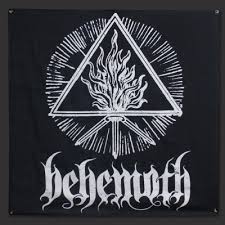I was already a little on edge just walking into the show. A lingering knee sprain from a Gogol Bordello concert meant no mosh pit but even so, I was worried about how I would get along with the crowd who had come to see Behemoth. Beside that I was on my own which created a certain amount of anxiety all by itself. Yet there I was, finding a seat in the balcony. Once I settled in and ordered a beer, my next job was finding a friend or at least a conversation partner.
I looked around for options. To my right was a couple in their late 20’s with the usual leather, tats and piercings. Several seats down on my left was big guy sporting a shaved head, lots of ink, a shirt that read “Blackcraft” and a laminated VIP badge.
I opted for door #1.
They were friendly enough. We chatted about beer and the bands for a while but there was no real connection. Once that conversation petered out I glanced back to my left. I’m not a small man (6 ft and 225) but this guy made me feel puny. He looked like he made his living as a bouncer at some very nasty bars. Not the most inviting conversation partner to say the least.
So I had to decide… which fear was going to get the better of me? Was it worse to go through the concert alone? Or to broach a conversation with a guy who looked like he could kill you just by being a bad mood?
This time I went for door #2. After the customary “How you doin?” I asked if he was with the band? Turns out that he was just a fan who had come up extra early for a VIP meet and greet with Behemoth. In fact he had left early that morning to drive all the way from south of Richmond, VA. As he shared the experience of meeting Nergal and company and what nice guys they all were, I moved a seat closer.
I welcomed him to Philly and we introduced ourselves. I asked Matt what he was drinking.
“Jack and coke.”
I ordered our next round. He insisted on getting the next one. While we waited I told him about the opening act, Myrkur, then we discussed other bands we liked. Like me, Matt has wide-ranging tastes. He rattled off a long list of genres that on his phone. My ears perked up when I thought I heard him say “Praise Music” but I let it go.
After some time the conversation drifted from music to our families. He’s got three kids, all younger than mine. From there it was an easy segue into the trials and tribulations of parenting. In addition to working hard as a telecom lineman, Matt also worked hard to instill decency, respect and morality into his kids.
At this point I couldn’t help but circle back. “Hey Matt, earlier when we were talking about music, did you say you liked praise music?”
“That’s right.”
“So are you a churchgoer?”
“Indeed I am.”
“That’s cool. I’m an Episcopal priest”
At that point Myrkur took the stage.
Between the sets we talked about Jesus. We talked about the perceived contradictions of being a Christian and liking metal. I asked him about the Blackcraft shirt. He said it was pretty much the same thing as liking Behemoth. He liked the designs and didn’t worry about how others might interpret them. He knew what he believed and the rest was of little importance.
I respected that. I’m not sure that, even if I liked it, I would ever feel comfortable wearing something covered in the symbols of Satanism or black magic, but I admired his sense of himself and his confidence.
So there we were, surrounded by pentagrams, goats heads, 666’s and every other imaginable symbol hostile to Christianity, and we were talking about Jesus and the challenge of trying to raise decent children in the 21st century.
Once the show ended I told him that since he was facing a seven hour drive he was welcome to crash at my place. He insisted he was fine. Even so, I couldn’t let him leave without partaking of one of Philly great late-night institutions.
We poured out of the TLA and across the street to Lorenzo’s. I must admit that it was gratifying when he marveled at the size of slices. Although the place was mobbed, we were given enough berth to finish our pizza comfortably (one of the perks of looking big and scary I suppose).
Back out on the street we hugged and then he gave me his VIP lanyard. I protested but he insisted that he still had plenty of swag to remember the show. And this way I would have something too. We exchanged numbers. Not knowing his last name I just put him under “Metal Matt.”
Some of my favorite Gospel stories show Jesus finding faith in the most unlikely people- soldiers, lepers, prostitutes and tax collectors. Time and time again he marvels to find they have more than religious professionals and otherwise upstanding citizens. When I first saw Matt sitting down the row, I was scared to talk to him. By the end of the night I was happy to offer him the guest room in my home. And from a concert that, at least on the surface, was all about celebrating Satan, what I found instead is that faith continues to show up when you least expect it.





















